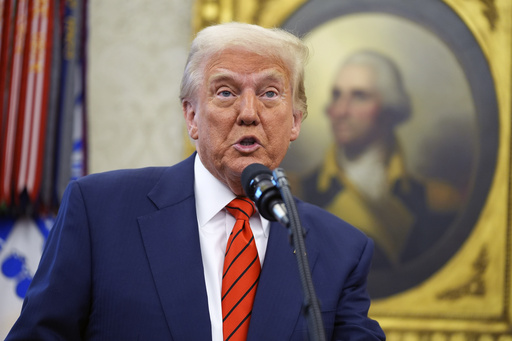
WASHINGTON — President Donald Trump has assured voters that his administration would not squander American lives or taxpayer resources on distant military interventions and efforts to build nations. However, merely weeks into his second term, the Republican leader unveiled plans for the United States to “take over” and redevelop Gaza. He also suggested a potential reassertion of U.S. control over the Panama Canal and even entertained the notion of purchasing Greenland from Denmark, a nation not inclined to give up the territory.
This shift in rhetoric from an “America First” motto to a more expansive “America Everywhere” approach has left some of his supporters astounded and questioning his sincerity. “The quest for peace ought to be led by the Israelis and Palestinians,” commented Sen. Rand Paul—a Republican from Kentucky and Trump ally—on social media. “I thought we voted for America First. We have no business considering yet another occupation that could squander our resources and endanger our soldiers’ lives.”
Trump’s surprising announcement on Tuesday, which calls for relocating around 1.8 million Palestinians from Gaza and transforming the war-torn area into the “Riviera of the Middle East” under presumed American ownership, raises urgent questions regarding the trajectory of his foreign policy in this unorthodox second term. Some are left wondering whether Trump is simply trying to project strength globally, provide support to Israeli Prime Minister Benjamin Netanyahu, or if his proposal stems from a perspective akin to that of a New York real estate mogul. Or perhaps it encompasses elements of all of the above.
Regardless of the motivation, Trump’s vision for Gaza has baffled political circles in Washington and beyond as they attempt to unravel the implications of his foreign policy stance.
To ease mounting worries about his plans, Trump’s advisors took steps to clarify the administration’s position just one day after his provocative remarks regarding a “world-class” redevelopment initiative for Gaza, which would entail relocating residents to nearby Arab nations. His Secretary of State, Marco Rubio, and Press Secretary Karoline Leavitt tried to distance the administration from the implication of permanent relocation of Gazans. Rubio characterized Trump’s intention to take “ownership” of Gaza and reconstruct the area as a “generous” proposal.
“It was not an act of aggression,” Rubio stated during an official visit to Guatemala. “That was intended to be a very generous move.” He further explained that the dire circumstances in Gaza, marked by unexploded ordnance and significant debris, would render the region uninhabitable for an extended period, necessitating the relocation of its residents temporarily.
While Trump did not dismiss the possibility of deploying U.S. troops to accomplish this ambitious plan, Leavitt sought to reassure the public that the proposal would not financially burden American taxpayers and did not imply the presence of U.S. military forces on the ground in Gaza. “The president has been clear that American involvement in rebuilding is crucial for regional stability,” Leavitt noted. “However, this does not equate to boots on the ground in Gaza, nor will American taxpayers be footing the bill for this initiative.”
Despite the assurances, the White House has yet to clarify the legal basis on which Trump could implement his Gaza plan. Furthermore, there has been no explanation of how he would address the strong resistance he might face from regional allies such as Egypt and Jordan regarding the relocation of Palestinians.
Still, administration officials insist that Trump is seeking solutions to the long-standing conflict between Israelis and Palestinians, a problem that has confounded many previous administrations. “Insanity is repeating the same actions and expecting different results,” Leavitt remarked. “President Trump is a visionary leader, an out-of-the-box thinker, committed to addressing issues that many in this city deem unsolvable.”
Meanwhile, Trump’s expansive outlook towards Gaza comes at a time when he is also advocating for the termination of the U.S. Agency for International Development (USAID), which plays a crucial role in providing essential aid to combat hunger, disease, and poverty worldwide. This juxtaposition has alarmed some of his Democratic opponents.
Sen. Chris Coons, a Democrat from Delaware, labeled Trump’s Gaza proposal as “offensive, insane, dangerous, and foolish.” He warned that such rhetoric could lead global observers to view the U.S. as an unreliable partner in international relations. Coons further expressed frustration over Trump’s simultaneous push to dismantle USAID while proposing a costly intervention in one of the world’s most significant humanitarian crises. “Why would we jettison established humanitarian efforts and plunge into one of the globe’s most formidable humanitarian challenges?” he questioned.
Trump’s proposals encountered widespread rejection from European and Middle Eastern allies, including those he has called upon to shelter the hundreds of thousands of Palestinians rendered homeless by ongoing conflict. The Arab League criticized the plan as “a recipe for instability,” while British Prime Minister Keir Starmer emphasized the necessity for displaced Palestinians in Gaza to have the opportunity to return home. German Foreign Minister Annalena Baerbock condemned the notion of displacing Palestinian civilians, declaring it “unacceptable” and “against international law.”
Even Trump’s allies voiced skepticism about the feasibility of American boots on the ground in Gaza. Sen. Lindsey Graham proposed reverting to previous strategies aimed at dismantling Hamas while seeking pathways for Arab nations to assume governance in Gaza and the West Bank, which could eventually lead to a Palestinian state that is acceptable to Israel. As his Gaza proposal faced backlash, Trump maintained that support for his vision was widespread. “Everybody loves it,” he asserted during a brief press interaction.

